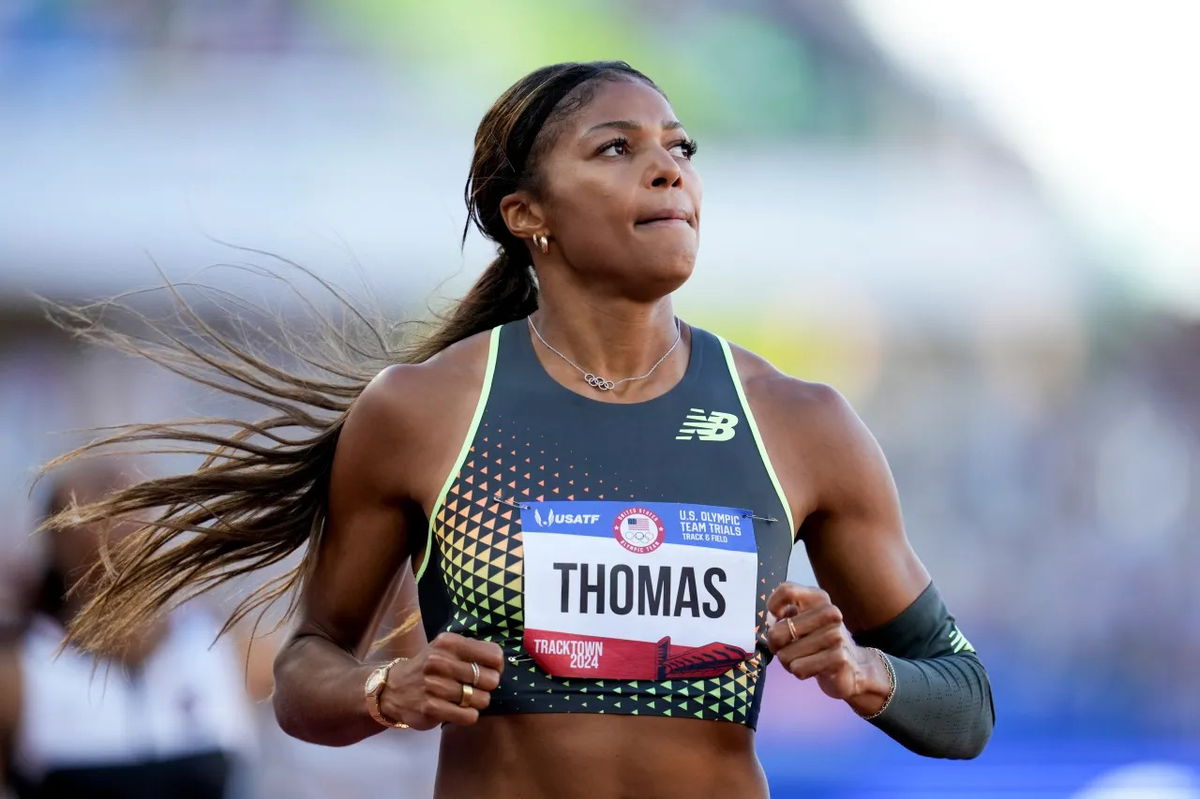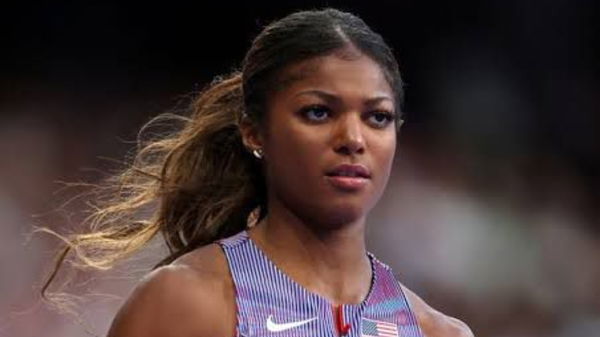

It was supposed to be just another routine trip. A departure gate, a flight to catch, maybe a quiet moment before takeoff. But for Olympian Gabby Thomas, air travel had taken on a new, chilling meaning. In January of this year, Gabby shared something deeply unsettling in a TikTok video that quickly caught the attention of the athletic world. She wasn’t posting about her training, her wins, or life on the road. This time, she was pleading.
Watch What’s Trending Now!
“At this point, every time I travel, I’m afraid that these men are going to show up and harass me.” Gabby’s voice, usually steady with confidence, cracked with the weight of fear. She described how, on multiple occasions, a group of three to six middle-aged men had appeared at various airports across the country—Chicago, Miami, and others. They didn’t just linger near baggage claim or sit in crowded terminals. These men were waiting for her. At the right gate. At the right concourse. Past security.
“They have my flight information,” Gabby said, visibly shaken. “And they show up at the front door of the airport at the correct concourse or they show up at my gate, which means they have flight tickets and they get past security and all that.” It wasn’t a one-time event. It had become a pattern. A terrifying, invasive routine. She had no answers, only fears. Gabby took some basic precautions—changing her email passwords, keeping flight details strictly private. But that did little to ease the anxiety gnawing at her before every trip. And when she turned to her followers, asking for help or advice, the comments only deepened the concern.
ADVERTISEMENT
“This has happened to me MULTIPLE times!! It is actually so scary.” Suni Lee commented. Ilona Maher also shared similar experiences, as she commented on her post. Likewise, Simone Biles reached out to her for support. The message was clear, it wasn’t just Gabby. This was a trend—a horrifying, growing pattern that women athletes were now facing in silence, until one brave voice cracked open the conversation. And now this week, in an interview with Katie C Reilly of Elle, Gabby reflected on what the experience revealed about a deeper problem. “A big part of the problem is that people feel entitled to accessing athletes as a whole, but especially women,” she said. Her words didn’t waver this time.
There was strength beneath the frustration.“And a lot of the time, when we don’t grant them that access, they can become hostile, and sometimes start to harass, which is what happened to me at the airport during my TikTok incident.” And that’s another challenge for female athletes. Gabby Thomas—Harvard graduate, Olympic medalist, role model—had become a target simply for being visible. Needless to say, the male athletes do not face similar issues.
ADVERTISEMENT
For Gabby Thomas, the track has always been a place of clarity. Of speed. Of purpose. A place where she could put her head down, run her race, and let the stopwatch speak for itself. But even at the top of her sport, being one of the fastest women in the world hasn’t protected her from the noise that follows women athletes everywhere. “There is definitely the added issue of objectification and constant scrutiny that male athletes don’t get quite as much of,” the three-time Olympic winner added. “Whether it’s our hair, our clothing, or just how often we smile—there is always something to pick apart.” And that’s the quiet contradiction at the heart of so many female athletes’ careers.
ADVERTISEMENT
On the one hand, female athletes are told to chase their dreams. Train hard. Be the best. But what no one warns them about is the invisible weight they’ll be expected to carry once they reach the top. For women in sports, excellence isn’t enough. They must be exceptional and palatable. Fierce but likable. Strong but not too outspoken. There’s always an “and” or a “but” attached. “We tell young girls to work hard to be the best in their sport—what we neglect to mention is what else they’ll be forced to face at the top,” Thomas said. And what she’s faced has gone far beyond critiques of appearance or online comments.
It’s been feared in airports. Strangers are tracking her. The constant pressure to shrink her presence, even as she’s making history. “I just want to run fast. I’m good at my job,” the 28-year-old athlete said plainly. But even that—something so simple, so honest—is weighed down by expectations and intrusions that have nothing to do with the work she’s put in on the track. “Unfortunately, that just comes with additional challenges that have nothing to do with my sport, a lot of which male athletes don’t have to experience.” For Gabby Thomas, the race doesn’t end at the finish line. Off the track, she’s still running—dodging scrutiny, harassment, and the exhausting demand to be everything to everyone. Example of scrutiny?
ADVERTISEMENT
Gabby Thomas explains the scrutiny that followed her dance
On April 16, Gabby Thomas had a message—and she didn’t need words to say it. In a now-viral TikTok clip, the Olympic sprinter stared into the camera, face calm but cutting. The caption said, “Marginalizing our own marginalized community 😢.” but it was her expression that really did the talking: a cocktail of disappointment, weariness, and just the faintest whisper of ‘y’all really tried it.’ What sparked the response? A dance. Yes, a dance.
Gabby had shared a lighthearted moment of herself learning the Dougie—wrists dipping, shoulders swaying, grin shining. It was pure vibes, pure joy. But joy, as the internet has proven time and time again, is apparently controversial. After her clip made its way to X (formerly Twitter), someone quote-posted it with a jaw-dropping take: “This is a white woman… I will not elaborate.” And that was it. No context. No reasoning. Just a drive-by accusation of cultural inauthenticity aimed at a Black woman doing a Black dance.
Top Stories
PGA Tour Champ Disqualified for Using Banned Item at Farmers Insurance Open

Travis Kelce Confirms Sporting Decision Away From Chiefs After TE’s Major Career News

Josh Allen Officially at Risk of Losing 21 Players as Bills Coach Quits Hours After Joe Brady Announcement

Jason Kelce to End Partnership With ESPN Days After Announcing New Broadcasting Move – Report

Blue Jays Told to Thwart Dodgers’ Plan After Scott Boras Pushes 24-Year-Old Star to Reject Reds’ Historic Deal

NBA Announces Emergency Meeting With Cavs After Luka Doncic Injury: 3 Potential Fixes for Raised Court

ADVERTISEMENT

Gabby, known for her grace both on and off the track, didn’t explode. But she did respond—with class, precision, and a whole lot of side-eye. “‘You’re whitewashed’ — God forbid I don’t let my skin color dictate my personality and interests,” she wrote in the TikTok text overlay. It was the kind of mic-drop moment that echoed far beyond her followers. Because this wasn’t just about a dance move—it was about the exhausting, infuriating experience of being policed within your own community for not fitting a narrow mold.
ADVERTISEMENT
Gabby’s clapback wasn’t loud—it was clear. She’s not here for the gatekeeping, the respectability politics, or the tired idea that Black identity comes with a fixed checklist. She can sprint, she can Dougie, she can dominate the world stage and enjoy her off-days however she pleases.
ADVERTISEMENT
ADVERTISEMENT
ADVERTISEMENT